



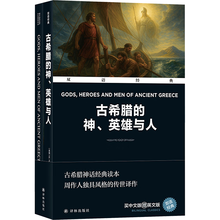
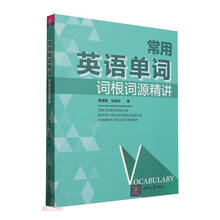
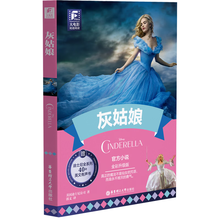
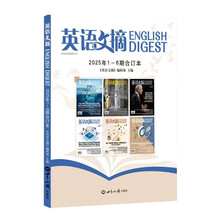
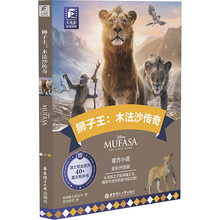


The Little Boat That SailedThrough Time
驶过时间海洋的小舟
I spent the tenth summer of my childhood, themost memorable months of my life, in western Norwayat the mountain farm where my mother was born.What remains most vivid in my mind are the times Ishared with my Grandfather Bob.
As an American, I always thought people simplybought whatever they needed. Whether Grandfatherknew this, I don’t know. But it seems he wanted toteach me something, because one day he said, “Comewith me. I have something for you.”
I followed him into the basement, where he led meto a workbench by a window. “You should have a toyboat. You can sail it at Storvassdal,” he said, referringto a small lake a few miles from the house.
Swell, I thought, looking around for the boat. Butthere was none.
Grandfather picked up a block of wood, about18 inches long. “The boat is here,” he said. “You canbring it out.” Then he handed me a razor-sharp ax.
I wasn’t sure what to do, so Grandfather showedme how to handle the tool. I started to chop away toshape the bow. Later, after he taught me the properuse of hammer and chisel, I began to hollow out thehull.
“It’ll be a fine boat, and you’ll make it all withyour own hands,” he said. “No one can give you whatyou make for yourself.” The words rang in my head asI worked.
Finally I finished the hull and made a mast. Thenmy boat started sailing. It wasn’t much to look at, butI was proud of what I had built. I launched my boatand daydreamed while a slight breeze carried thelittle craft to the opposite shore. The air was crisp andclean. There was no sound but the occasional warbleof a bird.
A crisis developed when we were ready to returnto America. “You cannot bring that boat with you,” mymother said. We already had too much baggage.
Feeling blue, I went to Storvassdal for the lasttime before we left, found that large boulder, placedmy boat in a hollow space under its base, piled stonesto hide it and resolved to return one day to recover mytreasure.
In the summer of 1964, I went back to Norwaywith my parents, my wife and children. I shall neverforget that moment. As I cradled the boat, I could feelmy grandfather’s presence. He had died 22 yearsbefore, and yet he was there. We three were togetheragain: Grandfather, me and the little boat.
My last trip to Storvassdal was in 1991. Thistime I brought two of my granddaughters fromAmerica: Kitty, 13, and Maggie, 12. As we climbed themountain, I thought of my grandfather and comparedhis life with that of my granddaughters.
Working tirelessly on that isolated farm, mygrandfather taught me that we should be contentedand grateful for what we have whether it be much orlittle. We should bear the burdens as well as relishthe joys. There is so much we cannot control, but weshould try to make things better when it’s possible.We should depend upon ourselves to make the best ofit in our own way.
That day, I took them to Storvassdal, hoping theywould somehow understand the importance of thelittle boat and its simple message of self-reliance.
High in the mountain, I hesitated to speak lestI would disturb our tranquility. Then Maggie lookedup and broke my reverie as she said softly, “Grandpa,someday I’ll come back.” She paused, “and I’ll bringmy children.”
bow n. 船首
chisel n. 凿子
hull n. 船体
boulder n. 卵石
cradle v. 轻轻地怀抱
contented adj. 满足的
十岁那年的夏天,我是在挪威西部的大山农场里度过的,那里是妈妈出生的地方。那几个月是我一生中最难忘的时光,至今令我记忆犹新的是和外公鲍勃在一起时的情景。
作为一个美国人,我一直以为需要什么就去买什么是再简单不过的事。外公知不知道这一点我不清楚,但他好像想教我些什么,因为有一天他说:“跟我来,我给你一样东西。”
我跟他来到地下室,跟他走到窗边的工作台前。“你应该有只玩具船。你可以让它在斯德瓦斯德尔漂航。”那是离家几英里远的一个小湖。
太棒了,我想,环顾四周,寻找那只船。可是什么也没有。
外公捡起一块木头,大约18 英寸长。“小船就在这儿,”他说,“你来做做看。”然后他递给我一把锋利的斧子。
我不知从何处下手,外公教我怎么用工具。我开始削木头,做出船首的形状。后来外公又教我如何用锤子和凿子,我开始连挖带凿做船体。
“这将是一只很棒的小船,而且是你自己亲手制作的。”他说,“别人送给你的代替不了你亲手制作的。”我干活的时候,这些话一直在我脑海里回响。
终于船体做完了,我又做了个桅杆。小船下水了。它看上去没什么特别,但我为自己的作品感到很自豪。小船启航了,我幻想着它会乘着微风驶到对岸。空气清爽,静寂无声,只有偶尔的鸟鸣。
当我们收拾行装准备回美国时,不幸的事情发生了。“你不能带着那只小船。”妈妈说。我们的行李太多了。
我很伤心,临走前最后一次来到斯德瓦斯德尔湖边,找到那块巨大的卵石,把小船放在石头底部的窝缝里,外面堆起石块做掩护,我打算今后某一天我还会来找回我的宝贝。
1964 年夏天,我带着父母、妻子和孩子一起又回到了挪威。我永远忘不了那个瞬间。当我将小船捧在手里,我能感觉到外公又回到了我的身边。虽然他22 年前就去世了,但当时他就在那里。我们三个又在一起了――外公和我,还有那只小船。
我最后一次去斯德瓦斯德尔湖是1991 年。这一次我从美国带来了我的两个孙女:13 岁的姬蒂和12 岁的玛吉。我们爬山时,我想起了外公,比较着他和我孙女们的生活。
外公不知疲倦地在那个偏僻的农场里劳作,他教我要学会知足和感恩――不论丰足还是匮乏,都要挑起重担并享受欢乐。人生有太多的事无法控制,但我们应该尽己所能改善处境。我们应该依靠自己的力量,以自己的方式做到最好。
那天我把她们带到斯德瓦斯德尔湖,我希望她们多少能懂得那只小船的重要性,它传达出的信息很简单――自力更生。
在高高的山顶上,我犹豫要不要讲话,唯恐打破我们的宁静。后来玛吉仰头看着我,打断了我的幽思,她轻声细语地说:“爷爷,将来有一天我会回来的。”她停顿了一下又说道,“也带着我的孩子。”
……